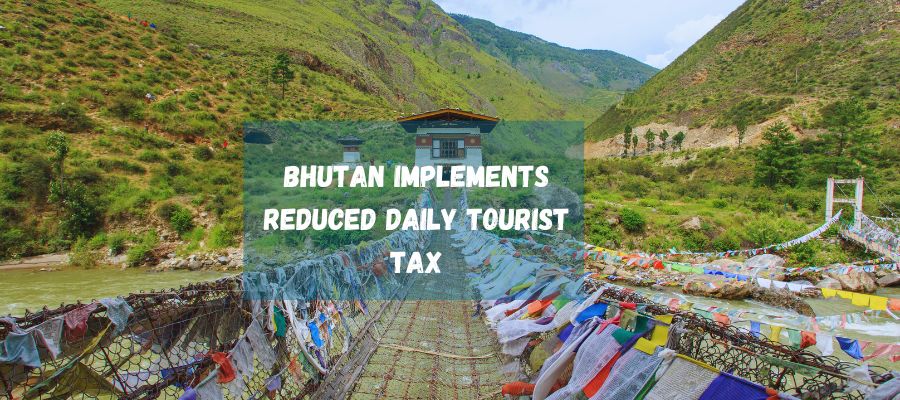- News >
- Bhutan Implements Reduced Daily Tourist Tax to Encourage Extended Stays
Bhutan Implements Reduced Daily Tourist Tax to Encourage Extended Stays

In an effort to revitalize its tourism industry, Bhutan has implemented a new policy to reduce the nightly fees charged to tourists who stay in the country for an extended period. The decision comes as Bhutan aims to recover from the significant decline in visitor numbers caused by the COVID-19 pandemic. By offering incentives for longer stays, the government hopes to attract more tourists and stimulate economic growth in the country.
Lowering the Sustainable Development Fee (SDF)
Upon reopening its borders to tourists in September of the previous year, Bhutan raised its "Sustainable Development Fee" (SDF) from $65 to $200 per visitor per night. This increase was aimed at attracting wealthier tourists while discouraging budget travelers who may have a larger environmental impact. The funds generated from the SDF are crucial for maintaining Bhutan's pristine landscape and offsetting the carbon footprints left by visitors.
However, with the aim of encouraging more visitors and promoting extended stays, the government has decided to temporarily reduce the SDF. This reduction in nightly fees is expected to make Bhutan a more appealing destination for tourists, especially those looking to explore the country at a slower pace and immerse themselves in its unique cultural and natural attractions.
Promoting Extended Stays
To encourage visitors to stay in Bhutan for longer durations, the government has announced a temporary reduction in the SDF. Starting this month and lasting until the end of 2024, tourists who pay the daily fees for a minimum of four days will be permitted to extend their stay for an additional four days. Similarly, those who pay the SDF for a period of 12 days will have the opportunity to stay in Bhutan for an entire month.
By providing these incentives for extended stays, Bhutan aims to showcase its diverse range of experiences, including its breathtaking landscapes, rich cultural heritage, and the opportunity for travelers to engage in sustainable tourism practices. This initiative not only benefits tourists by allowing them to fully immerse themselves in the country's offerings but also benefits local communities by creating opportunities for increased cultural exchange and economic growth.
Impact on Economic Growth
Dorji Dhradhul, the director general of the Department of Tourism, expressed optimism about the economic benefits this initiative could bring. By enticing tourists to stay in Bhutan for extended periods, the country anticipates a faster growth rate for its economy. Currently, tourism contributes around 5% to Bhutan's $3 billion economy, but the government aims to increase this contribution to 20% in the future. While no specific timeline has been provided, the reduction in nightly fees is seen as a step towards achieving this goal.
With increased tourist spending, the local economy can experience a boost as visitors engage in various activities, such as exploring historic sites, participating in cultural events, and supporting local businesses. The extended stays allow travelers to delve deeper into Bhutan's unique way of life, fostering a more meaningful connection between tourists and the local communities they encounter during their visit.
Limitations and Exclusions
It is important to note that the reduced nightly fees apply exclusively to tourists who pay in U.S. dollars. Visitors from neighboring India, who pay in Indian rupees, are not eligible for this incentive. This distinction is likely due to the significant number of Indian tourists who visit Bhutan and the impact of currency exchange rates. However, Bhutan continues to welcome Indian tourists as an important source of visitors, and they can still enjoy the country's cultural and natural wonders, albeit without the specific benefits of the reduced nightly fees.
Visitor Statistics and Future Outlook
Since the beginning of the year, Bhutan has welcomed over 47,000 tourists, indicating a gradual recovery of the tourism sector. The government's target is to receive approximately 86,000 visitors by the end of this year. While this number is considerably lower than the pre-pandemic figure of about 315,600 visitors in 2019, it represents a realistic goal given the ongoing global travel restrictions and the cautious approach to reopening borders.
Bhutan's strategic approach to tourism, focusing on sustainable practices and high-value experiences, has helped it maintain a reputation as a unique and exclusive destination. By implementing measures such as the reduction in nightly fees for extended stays, Bhutan aims to strike a balance between promoting tourism and preserving its cultural and environmental heritage. This approach sets Bhutan apart from other destinations and appeals to travelers seeking authentic experiences and responsible travel options.
In conclusion
Bhutan's decision to reduce the nightly fees for tourists staying for longer durations demonstrates the government's commitment to rebuilding its tourism industry. By providing incentives for extended stays, Bhutan hopes to attract more visitors and accelerate its economic growth. The initiative aligns with Bhutan's ongoing efforts to balance tourism with environmental preservation and ensure the sustainable development of this unique Himalayan kingdom. As the world gradually recovers from the impacts of the pandemic, Bhutan is positioning itself as an attractive and conscientious destination for those seeking transformative travel experiences.
